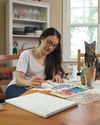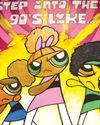
This love story begins with apricots.
Richard Solar, a young artist living in New York City in the 1950s, escaped the city one afternoon with his hiking group. During the group’s lunch in the woods, he noticed a pretty woman—new to the city and new to the group— enjoying apricots from her bag. He knew an opportunity when he saw one.
He asked the woman if he could have an apricot. She said yes. He asked to take her out for a drink when their bus returned to the city. She said yes again. That evening, they met at the rooftop bar of the Beekman Tower Hotel. She was so nervous that she spilled her drink; he was smitten from the start.
Thus began a 50-year romance. Richard and Lolly married, raised a son. When they worked, they had careers they enjoyed. She was a secretary, and he was a commercial artist whose work took them to New York, Washington, Atlanta, and Clearwater, Florida. When they retired, they logged even more miles, exploring Brazil, Canada, Europe, and China. But Richard’s favorite moments with Lolly were spent closer to home, especially during the 15 years they lived in Atlanta. He’d find a restaurant in the country and take her there for lunch, using the drive to enjoy scenery and conversation. He loved that feeling, of Lolly in the passenger seat, of a long drive to a little restaurant, of believing they could talk all day.
Love stories begin without our notice. We don’t know when the apricot will remain an apricot, or when the apricot will become the opening line to a 50-year romance. Only in retrospect can we point to the mundane detail that got the whole thing started. Perhaps that’s why couples get a kick out of recounting their stories, the idea of so much springing from so little, of being characters in the same story before realizing it’s a story at all.
And love stories often end without our permission.
この記事は Charlotte Magazine の November 2016 版に掲載されています。
7 日間の Magzter GOLD 無料トライアルを開始して、何千もの厳選されたプレミアム ストーリー、9,000 以上の雑誌や新聞にアクセスしてください。
すでに購読者です ? サインイン
この記事は Charlotte Magazine の November 2016 版に掲載されています。
7 日間の Magzter GOLD 無料トライアルを開始して、何千もの厳選されたプレミアム ストーリー、9,000 以上の雑誌や新聞にアクセスしてください。
すでに購読者です? サインイン

‘This Is How We're Going to Make Your Child Better'
Pediatric neurosurgery is technically and emotionally complex—and traditionally dominated by men. As Novant’s first female pediatric neurosurgeon, Dr. Erin Kiehna Richardson has had to learn the intricacies of a demanding field and battle sexism along the way

The Dumbledore of CMC
A surgery resident wrote a series of children’s books and created a special kind of medical magic

LGBTQ HB2+5
Five years after the furor of House Bill 2, the LGBTQ community—in Charlotte, in North Carolina, and across much of the nation—fights attacks on new fronts

Oh, Snap!
New ‘selfie museum’ in Concord celebrates the 1990s

ALLISON LATOS
The WSOC anchor on her hard trek from one episode of loss and grief to another—and the meaning of resilience

GOOD HEALTH
For years, Charlotte has been one of the largest American cities that lacked a four-year medical school. The health care professionals who finally made it happen overcame a series of setbacks, false starts, and failures, and they plan to use their clean slate to create a new kind of community asset

Summer Partee
From woodwork to retail, the kindergarten teacher-turned-designer has learned how to do it herself

Uptown or Downtown?
Archives illuminate how long we’ve argued over the perennial question

NOW OPEN NOVEL ITALIAN
Paul Verica brings a simpler version of the city’s hottest food trend to NoDa

TOP DOCTORS 2021
The annual list you can't without